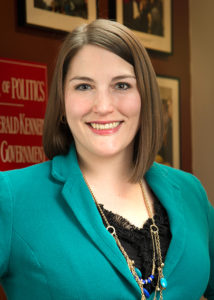Q&A with Roll Call’s Shira T. Center
 Political Parity’s Nadia Farjood recently met with Shira T. Center to pick her brain on gender in government. A fellow at Harvard University’s Institute of Politics and the Politics Editor for Roll Call (a leading news source on all things Capitol Hill), Center has covered scores of campaigns and was notably the last reporter to conduct an extended interview with Alaska Gov. Sarah Palin before her selection as the GOP nominee for vice president. Center is a member of the Running Start Advisory Council, a lecturer at the Women’s Campaign School at Yale University, and an annual speaker at American University’s Women & Politics WeLEAD program. Her honors thesis at Northwestern University focused on gender and communication in politics.
Political Parity’s Nadia Farjood recently met with Shira T. Center to pick her brain on gender in government. A fellow at Harvard University’s Institute of Politics and the Politics Editor for Roll Call (a leading news source on all things Capitol Hill), Center has covered scores of campaigns and was notably the last reporter to conduct an extended interview with Alaska Gov. Sarah Palin before her selection as the GOP nominee for vice president. Center is a member of the Running Start Advisory Council, a lecturer at the Women’s Campaign School at Yale University, and an annual speaker at American University’s Women & Politics WeLEAD program. Her honors thesis at Northwestern University focused on gender and communication in politics.
In short, Center is a renowned journalist and leader the women in politics field. Here’s what she had to say.
Nadia Farjood: Why did you first get into politics, and what has kept you in politics?
Shira T. Center: I’ve always been interested in politics and political journalism. But I was sold in 2004, when I traveled with my college newspaper, The Daily Northwestern, to cover the Iowa caucuses in Des Moines. I covered a 20-person caucus on that frigid, suburban evening. Before my caucus was over (Iowans love to talk politics!), officials had called the state for Kerry. The entire experience was so fascinating and exciting. I couldn’t believe people got paid to write about it. I was hooked.
NF: What are the biggest challenges and opportunities facing female candidates?
SC: The greatest challenge female candidates face is still incumbency. Many of my colleagues have latched on to the anti-incumbency, “kick the bums out” storyline for the last several cycles. And to be sure, Congress has endured significant turnover since 2006. But women have a better shot at winning in open-seat races, and those have not significantly increased in recent cycles.
The greatest opportunity for female candidates is with party organizations. All things being equal in a race, Democrats and Republicans prefer a woman to run. One operative estimated to me that a female candidate automatically gets a 2-4 point boost at the polls. (He cautioned this also depends somewhat on the quality of the candidate). The parties are clamoring for strong female candidates. It’s an advantageous time for women to get in the pipeline or run for Congress.
NF: Have you seen media representation of female candidates change over time? If so, how and why?
SC: Yes and no. The rise of online media has supported some new, feminist perspectives that probably would not have been heard in newspapers 20 years ago. I don’t have proof, but I think the average political junkie is more aware of how media covers male versus female candidates compared to 15 years ago. But that could also be a product of recent political campaigns (Hillary Clinton and, to a lesser degree, Sarah Palin) testing our notions of that.
At the same time, the rise of online media has changed our expectations for news to include visually appealing components. Almost every great story must have a multimedia companion — whether it’s a photograph, chart, or map. I think this is good for the news business because it forces us help the reader understand the news in innovative ways. But in future cycles, I worry an increasingly visual news culture will only highlight the gender of female candidates more in political coverage.
NF: In your years covering Congressional races, what qualities have you seen separate the successful female candidates from the unsuccessful ones?
SC: They are the same qualities that make a successful male candidate: desire to serve the country, a specific policy interest/reason to run, prolific fundraising, a strong network of support, ability to manage a team.
Instead, I’ll highlight one of the best female candidates I’ve met in the last few cycles: Sen. Heidi Heitkamp, D-ND. She had a compelling story, strong team, savvy strategy, and eye-catching advertisements. In a state that had never elected a woman to Congress, Heitkamp — a breast cancer survivor — played her gender perfectly for North Dakota’s political environment. This advertisement and this advertisement provide a perfect study of that.
NF: What are your predictions for 2016? Do you think we’ll elect the first female president, and why or why not?
SC: I’m 90 percent sure Hillary Clinton will run for president in 2016. Other than that? Well, I like my job too much.
